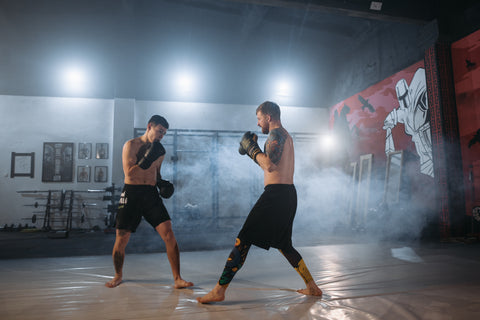Low Leg Kick in MMA: Everything You Need to Know
In this page we will explain what a low leg kick is, the evolution of leg kicks, how effective these kicks have been in the history of MMA, and how to check them.

Table of Contents
- What is a Low Leg Kick
- Evolution of Leg Kicks
- Effectiveness of Kicks in MMA
- Checking Calf Kicks in MMA
What is a Low Leg Kick
A low leg kick is a strike to the lower part of the leg, specifically below the knee, and above the ankle. It is commonly referred to as a calf kick.
The low leg kick focuses on a more vulnerable part of the leg, compared to the traditional kick to the thigh.
It strikes close to the top of the shin, where the smaller tibialis muscle doesn't offer the greatest protection to the nerves.

Evolution of Leg Kicks
Leg kicks in MMA have traditionally been focused towards the thigh of an opponent. It is not only easier to hit, it's a bigger target in general, and you can land it from a distance.
Due to this, MMA fighters have incorporated this into their game seamlessly.
However, in recent years the calf kick has come into the spotlight as a very effective kick.

Calf kicks on the other hand, you will typically have to get within closer distance in order to land it accurately, which also increases the percentage of you eating a shot from your opponent.
This increases the challenge of incorporating calf kicks into a fighter's game, as the entire goal of a fighter in the striking department is to hit and not get hit.
The calf kick has made waves this year as Dustin Poirier used this to successfully knock out Conor McGregor in their rematch. He was able to land almost at will against McGregor, and by round 2, his leg was completely incapacitated to the point where he could barely put weight on it.
Poirier then took advantage and was able to land clean shots, and eventually knock him out.

Effectiveness of Kicks in MMA
Miguel Baeza TKO
These kicks can be so devastating that they can handicap a fighter in under 2 rounds as shown here.
Florida's own!! Miguel Baeza gets the first finish at #UFCTampa! pic.twitter.com/kIiNMCTDyG
— UFC Canada (@UFC_CA) October 12, 2019
Aftermath - Dustin Poirier vs Conor McGregor
Although we see how devastating these kicks can be during a fight, take a look at how they are afterwards.
McGregor can't even walk without a limp, and this is a man who fought for the Interim Featherweight title with a torn ACL.
Those @DustinPoirier leg kicks were no joke!
— UFC on BT Sport (@btsportufc) January 24, 2021
Conor McGregor limps out of the arena after #UFC257 😳 pic.twitter.com/rGNm4wzD3N
Aftermath Jose Aldo vs Urijah Faber
Aldo hit Faber with as many vicious leg kicks that a human being can endure without somehow giving up. Take a look at what Faber's leg looked like afterwards.
Checking Calf Kicks in MMA
There is perhaps no better example of a fighter dealing with leg kicks than Jose Aldo. Although he is famous for dishing out the leg kicks over the years, he is also a master at checking them.
Aldo teaching everyone Calf Kicks aren’t real pic.twitter.com/GTDxxlsPL3
— Aiden (@aidenh25) June 22, 2020
Taking Weight Off the Lead Leg
Aldo shows that moving your weight off of your lead leg is an effective way to combat the calf kick.
However it has to be in a specific manner, he doesn't lift his leg completely up to do this.
In fact, he actually slightly moves his leg upward and then kicks his leg 'under his knee cap'. What this does is provides minimal impact towards his leg.
An easy way to think about this is think about hitting a planted tree with a baseball bat. Now think about hitting a tree that's dangling, and not planted.
The impact feels much greater when the tree is planted.
Moving the Shin Outwards
Another way to deal with these leg kicks are by moving your shin outwards. By doing this, the opponent throwing the leg kick bears the full impact of the hard shin, rather than the meat of the muscle that they were expecting.
Checking a few of these kicks in this manner will directly affect the person throwing those kicks.
They will throw less leg kicks, as that type of pain is difficult to deal with (and hide).
